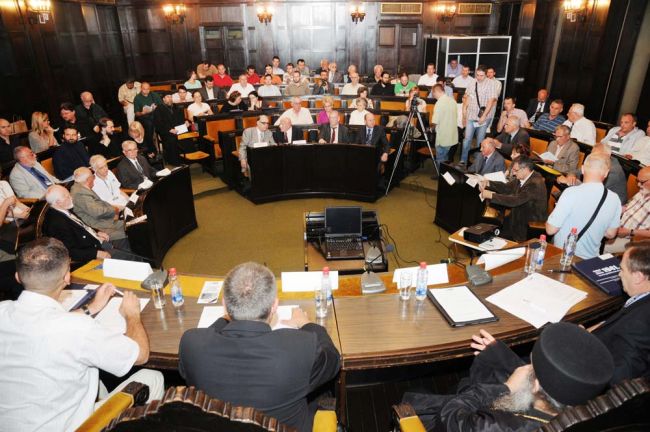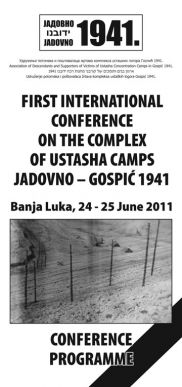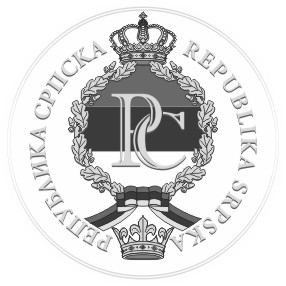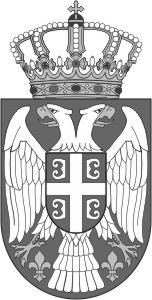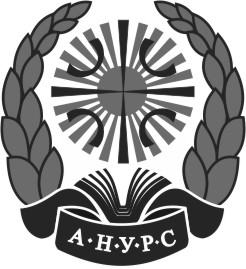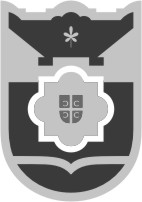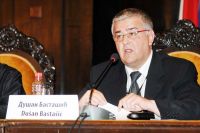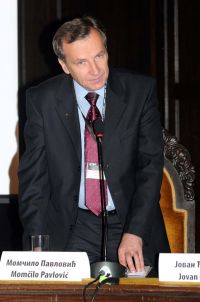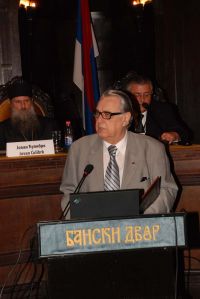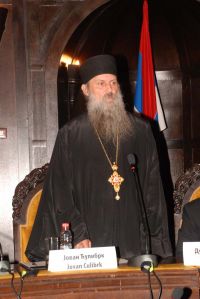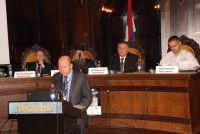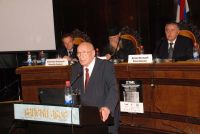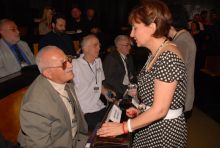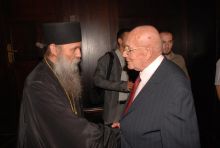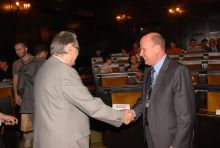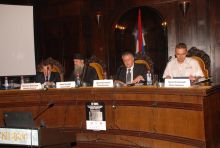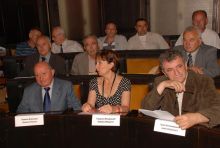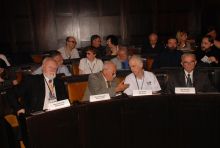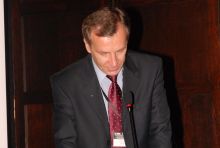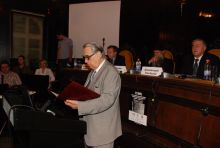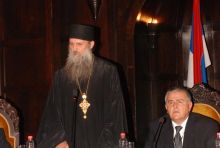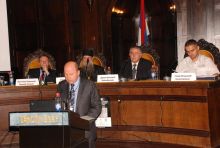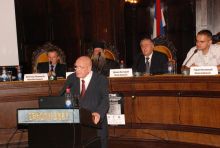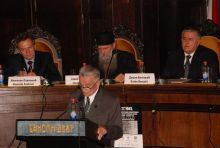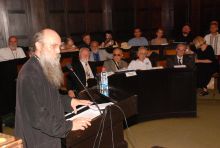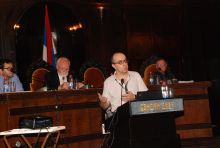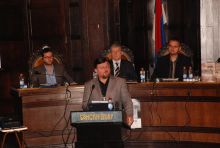-
In organisation of the Association of Descendants and Supporters of the Victims of the Complex of Ustasha Camps Gospić-Jadovno 1941, and in co-organisation of the Institute for Contemporary History from Belgrade and the Academy of Arts and Sciences of Republika Srpska, the First International Conference on the Complex of Ustasha Camps Gospić-Jadovno 1941 was held on 24 and 25 June, 2011 at the Conference Hall of the Banski Dvor in Banja Luka. Around fifty participants from Serbia, Croatia, Israel, United States of America, Italy, Germany, Russia, Austria, Republika Srpska and other countries took part in the Conference.
The First International Conference on the Complex of Ustasha Camps Jadovno – Gospić 1941 has been held in Banja Luka, 24 – 25 June, 2011 at the Banski Dvor Conference Hall.
Conference organisers


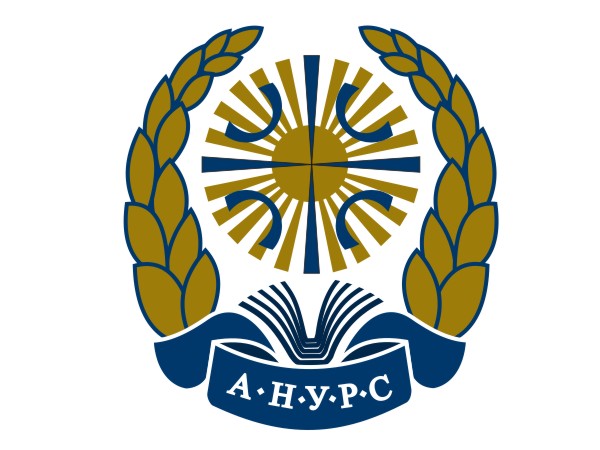
Jadovno 1941.
AssociationISI
Institute for Contemporary HistoryANURS
Republika Srpska Academy
of Arts and SciencesScientific Board of Conference
Prof. Momčilo Pavlović, Ph.D.
Institute for Contemporary History, BelgradeProf. Nikola B. Popović, Ph.D.
Academy of Sciences and Arts of the Republic of Srpska, Banja LukaMilan Koljanin, Ph.D.
Institute for Contemporary History, BelgradeVery Rev. Jovan Ćulibrk, M.A.
Jasenovac Committee
of the Holy Assembly of Bishops of the Serbian Orthodox ChurchGoran Latinović, M.A.
University of Banja LukaParticipants from Israel, Russia, Italy, USA, Germany, Austria, Croatia and Republika Srpska are going to give presentations at the Conference.
Conference Programme
Friday, 24 June, 2011. Banski Dvor Conference Hall:
09:00 – welcome address speeches, opening of the Conference
09:30 – Introductory presentation:
Đuro Zatezalo
JADOVNO – A COMPLEX OF CROATIAN USTASHA CAMPS – EXECUTION SITES IN 1941.
10:00 – Break, interviews, statements, media
10:30 – Session 1 – MEMORY IS NOT ENOUGH – Chair Jovan Ćulibrk
- Aleksandar Nećak: MEMORY IS NOT ENOUGH
- Ivan Čerešnješ: MEMORY AS IDEOLOGY IN CHANGING SOCIETIES -„Never again“ as a paradigm for Holocaust Memory –
- Ljiljana Radonić: WAR OF MEMORIES IN POST-YUGOSLAV AREA
- Efraim Zuroff: IMPORTANCE OF THE POST-HOLOCAUST JUSTICE IN THE EAST EUROPE AFTER THE FALL OF COMMUNISM
12:30 – Break
13:00 – Session 2 – SOURCES, DOCUMENTS AND TESTIMONIES – Chair Momčilo Pavlović
- Jovan Ćulibrk: MEMOIRS, AUTOBIOGRAPHIES AND BIOGRAPHIES OF MEMBERS OF ALLIED MISSIONS IN OCCUPIED YUGOSLAVIA AS SOURCES OF RESEARCH OF 1941 AND JADOVNO
- Mila Mihajlović: ITALIAN SOURCES – DOCUMENTS ON MASSACRE OF SERBS IN DALMATIA, LIKA AND KNINSKAKRAJINA (1941 – 1943)
- Dragan Šućur: SUFFERING OF CLERGY OF THE SERBIAN ORTHODOX CHURCH IN THE SYSTEM OF USTASHA CAMPS JADOVNO-GOSPIĆ IN 1941
14:30 – Lunch
16:30 – Session 3 – SECOND WORLD WAR CONTEXT – Chair Nikola Popović
- Kiril Feferman: NAZI “DIVIDE ET IMPERA”: COMPARING SOVIET AND YUGOSLAV CASES IN 1941
- Filippo Petrucci: ITALIAN OCCUPATION IN TUNISIA AND YUGOSLAVIA: DIFFERENCES AND SIMILITUDE IN THE RELATIONS WITH THE JEWS
- Raphael Israeli: ISLAM IN THE BALKANS UNDER THE GERMAN OCCUPATION
18:00 – Break
18:30 – Session 4 – JADOVNO IN THE POLITICS AND IDEOLOGY OF THE NDH – Chair Ivan Čerešnješ
- Milan Koljanin: CAMP GOSPIĆ IN CROATIAN NATIONAL AND RACIAL POLICY IN 1941
- Mladenka Ivanković: JADOVNO – “ARYANISATION OF CULTURAL ENVIRONMENT” OF THE INDEPENDENT STATE OF CROATIA – Jewish intellectuals and student youth as one of first victims of mass executions –
19:30 – End of Day 1 of the Conference
20:15 – Official Dinner
Saturday, 25 June, 2011. Banski Dvor Conference Hall:
09:00 – Session 5 – KALEIDOSCOPE OF INSIGHTS – Chair Filippo Petrucci
- Nikola Žutić: „BLOODY SUMMER IN LIKA OF 1941“ – ROMAN CATHOLIC INSTIGATORS AND PERPETRATORS OF GENOCIDE
- Melita Švob: JEWS DIED IN JADOVNO
- Dani Novak: A SURVIVING CHILD CAMP INMATE – PERSONAL MEMORY AND TRANSFERRED EXPERIENCE
- Vladimir Umeljić: SOCIAL – PSYCHOLOGICAL ASPECTS OF THE PHENOMENON OF GENOCIDE (DEFINITIONISM – THEORY)
- Jovan Mirković: VICTIMS OF 1941 – 1945 WAR BORN IN THE AREA OF BOSANSKA KRAJINA ACCORDING TO THE REVISION OF THE 1964 CENSUS WITH SPECIAL EMPHASIS ON THE SUFFERING OF ELDERLY AND THE SUFFERING IN CAMP JADOVNO
11:00 – Closing of Conference, acknowledgement by the organisers, announcement of the evening promotion of books and the marking “Jadovno 1941 Remembrance Day” on the next day
Conference sponsors
The First International Conference on the Complex of Ustashas Camps Jadovno – Gospić 1941, was financially supported by the following institutions and individuals:
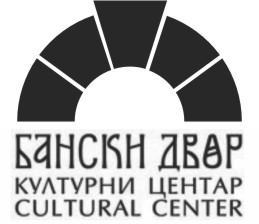


Banski dvor: Cultural Centre,Banja Luka Menadžer kompanija d.o.o.Banja Luka Elnos d.o.o.Banja Luka – MG Mind d.o.o. Mrkonjić Grad
– Association of Refugee and Other Organisations of Croatian Serbs, Belgrade
– Minaqua
– Alliance of anti-fascist fighters and anti-fascists of Croatia
– Mr Arie Livne
– Mr Dani Novak, USA
– Mr Bogdan and Ms Vesna Grahovac, Sweden
– Ms Dragica Ševo, Banja Luka
– Dr Vladislav Turnić, Dubrovnik
– Ms Jerina Malešević, Zagreb
– Pensioners Party of Republika Srpska
President of the Organising Committee
Dušan Bastašić, D.M.D
Jadovno 1941. Association
Opening addresses at the Conferencе
Dušan Bastašić, Conference Organising Committee
Mr Envoy of the President of the Republic of Srpska, Mr Vice President of Republika Srpska, Mr Envoy of the President of the Republic of Serbia, Mr President of the Academy of Arts and Sciences of the Republic of Srpska, Your Excellencies, ladies and gentlemen, good day to you!
Esteemed Archimandrite Jovan, elected Bishop of Lipljan, envoy of the Holy Synod of the Serbian Orthodox Church, honourable priests, descendants and supporters of the victims of Jadovno, brothers and sisters, may God bless you!
Today is truly a good day and God’s blessing is really upon us, because after seventy years we are witnesses to the first scientific gathering dedicated to the complex of Ustasha camps Gospić – Jadovno 1941.I greet you on behalf of the Association of Citizens Jadovno 1941, an association of descendants and supporters of the victims of the complex of Ustasha camps Gospić 1941, who initiated today’s conference.
The First International Conference on the Complex of Ustasha Camps Gospić – Jadovno 1941 has been organised by the Association of Citizens Jadovno 1941, the Institute for Contemporary History in Belgrade and the Academy of Arts and Sciences of the Republic of Srpska.
The first and important financial support to the organisation of the Conference was given by the Ministry of Religion and Diaspora of the Government of the Republic of Serbia. We express our deep gratitude to Minister Srđan Srećković.
A crucial financial support to the organisation of the Conference was given by the Government of the Republic of Srpska.
Special gratitude for his personal efforts in assisting the Conference we owe to Senator Arie Livne, Advisor to the President of the Republic of Srpska and Mr Vinko Bogdan, Assistant Minister for Science at the Ministry of Science and Technology of the Government of the Republic of Srpska.The organisation of the Conference was also supported by the Administrative Department of the City of Banja Luka, Cultural Centre Banski Dvor as well as several municipalities in the Republic of Srpska. Thank you!
A large number of descendants and supporters of the Jadovno victims helped the Conference with their modest financial contributions. While expressing my gratitude, I ask them to forgive me for not naming them.
Selfless help to the organisation of the Conference was given by employees of the Mendažer Company, a company that made all its staff, equipment and facilities available to the Jadovno 1941 association. Thank you!
In the preparation the scientific, expert part of the Conference, the crucial assistance was given by Archimandrite Jovan Ćulibrk, MA, elected Bishop of Lipljan, member of the Conference Scientific Committee. Father Jovan’s contribution in the internationalisation of the truth about the execution sites of Jadovno is beyond measure.We owe special gratitude to Professor Dr Momčilo Pavlović, Director of the Institute for Contemporary History in Belgrade, Goran Latinović, MA, from the University of Banja Luka and Ms Radmila Mihajlović from Rome who not only opened the door to Italian archives to us, but also helped the truth about Jadovno to be heard in the Italian and European Parliaments.
The Association of Citizens Jadovno 1941 would not have been founded, and this Conference would not happen today, if historian Dr Đuro Zatezalo had not dedicated most of his working years to the research of Jadovno and Gospić execution sites. The Museum of Genocide Victims from Kragujevac published in 2007 Dr Zatezalo’s capital two-volume work “Jadovno, a Complex of Ustasha Camps 1941” and “Jadovno, Collection of Documents”. Dr Zatezalo, many thanks for all your long years of work and efforts!Along with information we got from our families and experience in growing up before crying eyes of mothers and grandmothers covered in black scarfs, the horrifying truth read from Zatezalo’s books was crucial for our decision to establish Association Jadovno 1941.
Our intention was and is to have our knowledge about the execution sites of Gospić, Jadovno and the Island of Pag, through series of activities, serve to the preservation of the memory of the suffering of our families, turning it into our permanent memory.
We see our work as a responsible attitude towards our ancestors and our contribution to the struggle for biological survivor of our descendants.
Dear presenters, we owe you gratitude for the time you have taken and the effort you have made in order to verify the truth about the suffering in Jadovno in a manner appropriate to the historical science.
This Conference and your participation is also a contribution on the road to the truth, to the closing of a painful and dark chapter of our history and to consolidating the hope that descendants of the Jadovno victims, living today or still unborn, are not going to have the same fate.Ladies and gentlemen, brothers and sisters, on behalf of the Conference Organising Committee, on behalf of the descendants and supporters of the Jadovno victims, but also on behalf of the victims themselves, because they do not have a voice, allow me to open the Conference with words:
“Let us learn about Jadovno so that it would never happen again to anyone”.
Thank you.
Momčilo Pavlović, Institute for Contemporary History, Belgrade, Republic of Serbia
Dear participants of the Conference, honourable fathers, distinguished guests, ladies and gentlemen, not only was the Institute for Contemporary History given an honour, but it is also our duty to support, raise awareness of such gatherings, and especially the First International Conference on the Complex of Ustasha Camps Jadovno-Gospić 1941. Why do we as the Institute support this conference and why is it important after all? Only awareness of a crime guarantees that it is not going to be repeated. Because we believe that only through accurate reconstruction of historical events, cross-referencing first and second order evidence, crimes, and especially the crime of genocide over Serbs in the NDH can be scientifically verified, because this topic and the topic of genocide over Serbs in the NDH has not been thoroughly researched, because it has been relativized by other events, because controversial data created confusion, and because in a part of the public, especially the international and scientific community it has not been taken seriously, in our opinion. Because at the end of 20th century, in unfortunate circumstances, the Serbian people, who experienced genocide and who suffered the most in the Second World War, were accused of genocide and of being a genocide people. Because there are simply no Serbs in Croatia, the people who were once bearers of Yugoslav state policy and partially the communist ideology and practice. They are gone from areas where they had been living for centuries, and in other areas their number had been reduced to an insignificant percentage of the population in Croatia. Croatian policy, the European policy is fine, but there are no Serbs in those areas. Because the awareness of crimes and extent of hatred and bestiality should be preserved and developed in all citizens who live in this region. Because the Gospić-Jadovno complex was the first camp for the elimination of Serbs, Jews and others, established in the first week of Hitler’s attack on Yugoslavia, before it capitulated. Because in 132 days it existed, according to Dr Zatetalo’s research, over 40,000 people were murdered in cruel ways – 38,000 Serbs, around 2000 Jews, 78 Croats and 25 others. Of course, that number is not final. Because 11,000 of the victims were named, 71 of them priests of the Serbian Orthodox Church, two bishops included. In the end, so that time, the sieve of history as someone called it, does not consign to oblivion both the victims and the Serbs in that area. In the end, we feel the need to create a strong, modern, scientific institution in Republika Srpska, which would deal with specific issues of history and historical legacy in this region. Allow me to share my personal opinion that awareness is neither created, nor changed by mere observation and empty talk, but with thorough and serious studies. In that regard, our support for this conference is the beginning of the support by the Institute for Contemporary History to institutions and people in this region so that we could establish a scientific institution as soon as possible, regardless of what its name might be, which would be run with serious and firm hand, according to a plan, in order to investigate all historical controversies and events and leave the findings to future generations. This is all I had to say. I greet the participants in the conference. You can count on the support of the Institute for Contemporary History.
Rajko Kuzmanović, Republika Srpska Academy of Arts and Sciences, Banja Luka
Dear participants of this extraordinary gathering, ladies and gentlemen, it is my great pleasure to, for the first time, address you, participants of the First International Conference on the Complex of Ustasha Camps Jadovno-Gospić 1941. I would like to greet all of you and wish you a successful conference. For a long time our thoughts have been focused on the time of great suffering of innocent people in the early 1940-ties, and especially those who died in Gradina, Jadovno, Jasenovac and other places. These thoughts urged us to conduct some activities, and they also gathered us here. Today, my thoughts and words are focused with great attention to you, learned and honourable people, very moral and patriotic, who in this murky, utilitarian and marketing time bound their strength, mind and energy to historical truth and fates of hundreds of thousands of people. For your efforts, you do not expect any material gain, but expect, as all of us do, justice and truth. For that I am grateful, as are all patriots, families and descendants of victims, and the whole of anti-fascist and democratic world. Here, after almost 70 years, we are going back to the time in which deranged and insane mind of vampire fascist and Ustasha ideology rose against many peoples, first and foremost against the Serbs, Jews, and even Armenians and Romany. In this demonic plan and movement on the European soil there were genocide, crimes, gas chambers, Auschwitz, Mathausen, Jasenovac, Gradiška, Kragujevac, Jainci and especially Jadovno. And Jadovno, covered in misery, in only three or four months, devoured several tens of thousands of dead and living people in the grottos of Velebit’s pits. Most of the people who died there were Serbs, Jews, and a number of Croatian anti-fascists. The Ustasha monstrosity of killing surpassed even Italian fascists, who occupied the area of Jadovno at the time and prevented further killing of innocent Serbs and other patriots. Even today, many people are wondering why such an insane movement had to happen here in this part of the Balkans, a movement which wanted to exterminate whole peoples and why the issue of crimes in the former NDH, especially in Gospić and Jadovno, has been systematically covered up for such a long time. I hope that his conference is going to give answers at least to some extent on these and many other questions. It is truly difficult to find a logical constant of actions and development in this region and by that answer many open questions, because the Balkans has always been an area of uncertainty and instability. Except for short periods of time, the countries and people of Balkans never managed to establish such positions and distribution of powers and interests which would enable a long and peaceful time of development. There are many reasons for this, especially religious, ethnic, national, political, ideological and cultural differences, but also constant interests and tutorship of states outside this region. Foreign states and ideologies were bringing dissension between already confronting and opposing peoples. Fascist and Nazi ideologies had a drastic impact on the creation of the Ustasha ideology and the Quisling so-called NDH, whose monstrous extermination of Serbs, Jews and other freedom-loving peoples matched the Nazi genocide, and in many aspects it was even more horrifying. After fascism and its Quisling servants were defeated, it was expected that Ustasha crimes would be punished for misdeeds, which were until then unheard of. However, the authorities at the time reduced the crimes for the sake of reconciliation, and the crimes in Gospić, Jadovno and many other places were neglected. That is why today is the high time to establish the truth about Jadovno. The way to find truth is, among other things, to hold scientific and research gatherings, conferences and roundtables, such as this conference. We did not gather here, or in other similar places, to seek revenge and spread hatred. We have gathered to establish the truth about what happened in Gospić and Jadovno and many other places in the so-called NDH, with a wish that something like that is never forgotten and never happens again. We are looking for real, objective truth, because many events, Jadovno included, were covered by forgeries, rewriting dates and places of crime, reducing horrors and extensity of crimes. We must not allow history to be written based on forgeries. I believe and we all should believe that there is no such thing as a criminal people. There are criminals, bearers of insane ideology, who have their forenames and surnames. We need to say it clearly that the crime is never statute barred and that those who committed it must be punished. Of course, this does not console the victims, but it is a lesson and message for the future, for building peace and general progress. The attempts to rewrite history, which we are witnessing, warn us that it is necessary to intensify research of all aspects of the complex of camps, from Jadovno to Jasenovac. This research in its nature in inter-disciplinary, historiographical, anthropological, demographical, and forensic and involves many issues in relation to goals, character and operation of death camps. We are aware that this is hard and long work and effort, which cannot be considered as finished at this time. Our effort to investigate crimes and to give this issue international dimension does not mean that we want any conflicts. We only want the truth about the past, and we are sincerely turning towards the future, dedicated to peace, tolerance and with wish to move forward together with European states and peoples. In the end, I am deeply convinced that this conference, with you as participants, intelligent and humane people and researchers with good intentions, is going to shed more light on the crime in Jadovno, Gospić and other execution sites in these restless Balkan areas. I wish you much success in your work. Thank you.
Jovan Ćulibrk, Jasenovac Committee of the Holy Archpriest Synod of the Serbian Orthodox Church
Mr President, gentlemen, honourable fathers, brothers and sisters, the Holy Archpriest Synod of the Serbian Orthodox Church during its session held on 16 June, 2011, listened with great attention to the report submitted by the Jasenovac Committee, and also noted the invitation by Dušan Bastašić, the organiser of the First International Conference on the Complex of Ustasha Camps Jadovno 1941 and decided to support the conference, to send me as an envoy of the Holy Archpriest Synod and instructed me to greet the conference on behalf of His Holiness Serbian Patriarch Irinej, all members of the Holy Synod, with blessings and wishes that the Conference gives contribution and reveals new, unknown and hidden truths about the very beginning of the new Serbian Kosovo, the suffering in the Second World War, and who, as we say, recognised the biggest event which determined the Serbian identity after the battle in 1389. We especially need to greet Aleksandar Nećak, the President of the Union of Jewish Municipalities of Serbia and Senator of the Republic of Italy, Mr Finestra, because they represent communities which have the deepest connection with us in that period of time. Also, we need to mention several names which have the deepest connection to the history of memories of Jadovno and the studies conducted about it. In 1983, a group of students from the Faculty of Theology of the Serbian Orthodox Church came to Jadovno. They were led by current Mitropolite of Montenegro and Coast Amfilohije and former Episcope of Zahumlje and Herzegovina Atanasije Jevtić. This visit resulted in the book “From Kosovo to Jadovno”, which introduced into the Serbian language word Jadovno in a way that everybody heard it. The book had seven editions just in 1980-ties. The eighth edition was published recently and as far as the Church is considered, this was a turning point that shaped our memory on what happened in the Second World War. We need to give a special salute to all those people who came from countries such as Italy, Israel, Russia, USA, Austria, who came here because the memory I am talking about would not be possible without the basic truth on what happened in Jadovno. Often and perniciously we mix memory, politics and science. This gathering here, with its international dimension, with its scientific quality, is here to set things in their right place and to show that without basic knowledge we cannot do anything. The Jasenovac Committee of the Holy Archpriest Synod of the Serbian Orthodox Church really made effort in this. But we would not be able to help if it were not for the sacrifice of people who have the greatest desire to disseminate the truth about Jadovno, and if it were not for our friends who were willing to come here. They are not only our friends, but also friends of the truth. In the end this is the contribution of the Serbian Orthodox Church for this gathering. Thank you.
Mlađan Đorđević, Envoy of the President of the Republic of Serbia
Your Holiness, honourable fathers, dear working committee, participants of the First International Conference on the Complex of Ustasha Camps Gospić and Jadovno, ladies and gentlemen, this year we are marking 70 years from the time the world war knocked on the door of Yugoslavia. For our people it was the beginning of suffering we had not experienced before, genocide of Biblical proportions. According to the way this suffering changed our people it can only be compared to Kosovo, and by right it is called the New Serbian Kosovo. But, you know this better than anyone, because I am in a city and area which gave countless victims both to Jadovno and to Jasenovac. In science that period of time is called the time of barbaric warfare, and with reason. Truly, everything connected to Jadovno, the reason we have gathered here, is indeed barbaric – the fact that it was a death camp before Nazi death camps existed, the ways in which their short-time prisoners were killed, as well as the fact that the camp was established several weeks after the Independent State of Croatia was proclaimed and before any resistance to the NDH was made. But what happened after the liberation was no less barbaric. Just as in the case of Jasenovac, the traces of camps were carefully hidden, and the number of victims was a result of quick estimations. Soon, the criminals became abstract fascists, and victims even more abstract anti-fascists. The process of verifying the initial process, character of the suffering and the number of victims, which lasted for several decades in European countries, did not have suitable institutions, plan or continuity. The result is that even today we do not know some basic things, especially the identity and number of victims, and we still deal with it and discuss it. Jadovno is exception to this, but no thanks to the state or society, but to the efforts of one man. Dr Đuro Zatezalo, as the Director of the Historical Archives in Karlovac, had been conducting a study on Jadovno and its synthesis for decades, which was finally published in 2007 by the Museum of Genocide Victims. But Dr Zatezalo’s book is only the beginning and precondition for further work and research which is in turn a precondition to turning it into a memory and education. Therefore, the Republic of Serbia recognised the necessity to support this gathering which has high scientific and international credibility. Knowing the importance of memory on Jadovno and its victims, the President of the Republic of Serbia, on behalf of which I greet you here, is going to join you and all others who are going to Jadovno on Sunday, 26 June and participate in the memorial service for the victims of Ustasha genocide.
Arie Livne, Envoy of the President of Republika Srpska
Honourable participants of this historical and important conference, ladies and gentlemen, I have great honour to greet this conference on behalf of the President of Republika Srpska, Mr Milorad Dodik. I stand before you deeply emotional. I think, as I look at people here, that maybe I am the only survivor of the Holocaust here, and who lost his whole family. It is not important where it happened. In all places, all execution sites, Jasenovac, Auschwitz, Birkenau, Jadovno, everywhere they murdered in the most savage ways children, women, our parents. We are here never to forget it, never to forgive it. My predecessors said that there is no longer a fear of genocide. Unfortunately, I would disagree. Neo-Nazi forces in the world are getting stronger. The Jewish state, Israel is under constant threat of destruction, which means genocide and all of us together must fight against it. Neo-Nazism is dangerous as cancer. We do not notice it, and it is getting stronger and stronger. Pay attention to what is going on in the world. We too, although we are small, must fight against it.
Dear honoured friends, we live in a time of history full of cynicism and lack of belief in any ideology, in a world which does not believe almost in anything, except maybe money. In this world we should especially honour people who are here now, and others who take time to fight this evil, people who preserve ideals and preserve our feelings towards those who are absent. In one of my speeches in Jasenovac, more precisely in Gradina, I said: “Nobody has the right to speak on behalf those who are not here!”Because of my 90 years of age and because of the victims, because my whole family was destroyed, I take the right to say what would say those who are no longer with us. I think that they would agree with us that we must do everything, absolutely everything so that they are not forgotten, to remember them, because we know that a man dies twice: once when he dies and the second time when he is completely forgotten. We must not allow ourselves to forget those who are no longer with us, those who died partially for ideals, partially just for being Serbs, Jews and Romany. But there are many other nations. Let us not forget 22 million victims that the Soviet Union gave in the war. Therefore, I am greatly honoured to greet you, to wish you happy and successful work and long life. I would especially like to emphasise and greet the organiser and president of this conference, Mr Dušan Bastašić, whom I met two or three years ago, I do not remember, who on that occasion for the first time presented me with his plan for Jadovno. I believe that he deserves all possible honours for managing to organise this conference. I wish him to continue his work, a historic work, which is going to bring him deep spiritual peace at the end of his life. To you I wish successful work and happiness in life.
Greetings.
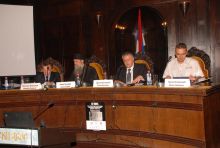 In organisation of the Association of Descendants and Supporters of the Victims of the Complex of Ustasha Camps Gospić-Jadovno 1941, and in co-organisation of the Institute for Contemporary History from Belgrade and the Academy of Arts and Sciences of Republika Srpska, the First International Conference on the Complex of Ustasha Camps Gospić-Jadovno 1941 was held on 24 and 25 June, 2011 at the Conference Hall of the Banski Dvor in Banja Luka. Around fifty participants from Serbia, Croatia, Israel, United States of America, Italy, Germany, Russia, Austria, Republika Srpska and other countries took part in the Conference.
In organisation of the Association of Descendants and Supporters of the Victims of the Complex of Ustasha Camps Gospić-Jadovno 1941, and in co-organisation of the Institute for Contemporary History from Belgrade and the Academy of Arts and Sciences of Republika Srpska, the First International Conference on the Complex of Ustasha Camps Gospić-Jadovno 1941 was held on 24 and 25 June, 2011 at the Conference Hall of the Banski Dvor in Banja Luka. Around fifty participants from Serbia, Croatia, Israel, United States of America, Italy, Germany, Russia, Austria, Republika Srpska and other countries took part in the Conference.The Conference was opened by the President of the Conference Organizing Committee, Dr Dušan Bastašić, which was followed by welcoming addresses by representatives of co-organizers, Professor Dr Rajko Kuzmanivć, the President of the Academy of Arts and Sciences of Republika Srpska and Professor Dr Momčilo Pavlović, the Director of the Institute for Contemporary History from Belgrade. Elected Episcope of Lipljan Archimandrite Jovan Ćulibrk greeted the participants of the Conference on behalf the Holy Archpriest Synod of the Serbian Orthodox Church. Father Jovan also informed the attendees that the management of Yad Vashem decided to classify this Conference as an international scientific Holocaust event of the first- grade importance.
The Conference was also greeted by an envoy of the President of the Republic of Serbia, Mr Mlađan Đorđević, as well as an envoy of the President of the Republika Srpska, Senator Arie Livne.
The introductory presentation was given by Dr Đuro Zatezalo, a historian who spent a large part of his working years studying tragedies of the Gospić system of Ustasha camps, which resulted in two capital books on the topic. The participants of the conference gave him special recognition for his efforts in researching and describing the tragedy in Jadovno and on Pag at the beginning of the Second World War in this area. The Conference commended and praised all Dr Zatezalo’s efforts in preserving the memory of the victims of the Ustasha system of camps Gospić, the first death camp in the criminal Independent State of Croatia, which existed from 11 April to 21 August 1941.
The series of systematic mass murders of innocent people in the wartime Croatia did not stop and lasted until 22 April, 1945 and the breakthrough of the last inmates of Jasenovac, because the last inmates from Pag and Jadovno were at the same time the first inmates of Jasenovac. According to long years of research by Dr Zatezalo, during the operation of the Gospić system of death camps the total of 40,123 persons were murdered (38,010 Serbs, 1998 Jews, 88 Croats, 11 Slovenians, nine Muslims, two Hungarians, two Checks, one Russian, one Roma and one Montenegrin), in so far recorded 33 bottomless pits on Velebit, Šaranova Pit near Jadovno being the one which devoured most of the victims, and the Gospić camp itself (prison, collection point at the railway station), camp Ovčara near Gospić, then the camp near Risova Glava, camp Slana and camp Metajna, and camp Stupačinovo near Baške Oštarije.
The Conference did not stop just on direct tragedy in Jadovno and on Pag, but this topic became a starting point for various expert presentations based on memories and study of Genocide, Holocaust, but also historical revisionism, which has been plaguing Eastern Europe, from the Baltic to the Black Sea, with the Balkans as no exception, especially Croatia.
After the introductory presentation by Dr Đuro Zatezalo, a Conference session followed named „Memory is not enough“ chaired by elected Episcope of Lipljan and Patriarch’s Vicar, Bishop Jovan (Ćulibrk).
In the first session the presentations were held by: President of the Union of Jewish Municipalities of Serbia Aleksandar Nećak (paper “Memory is not enough”); former President of the Union of Jewish Municipalities of BH and Expert Associate at the Hebrew University in Jerusalem Ivan Čerešnješ (paper “Memory as ideology in changing societies – ‘Never again’ as a paradigm to the memory of Holocaust”); lecturer from the University of Vienna and expert in political science Dr Ljiljana Radonić (paper: „War of memories in the post-Yugoslav area“), and university lecturer at the Political Sciences Department of the Ball University in the United States Dr Francine Friedman read a letter to the Conference by the Executive Director of the Simon Wiesenthnal Centre in Jerusalem Dr Efraim Zuroff (who was supposed to present the paper “Importance of post-Holocaust justice in Eastern Europe after the fall of communism”), after which Mr Salamon Jazbec from the Margel Institute in Zagreb spoke about the Ašner case and important social messages sent by the failure to prosecute him in Croatia and Austria.
Mr Jazbec spoke about the need to punish war crimes from the time of Holocaust, and the time of genocide over Serbian people in the criminal Independent State of Croatia. His speech coincided with the announcement of the death of Ustasha war criminal Milivoj Ašner, who died at the age of 99 without being punished in Celovec, his place of residence after he had escaped Croatian authorities in early June 2004. The full auditorium was very interested in this speech. As a manager of the town police department in Požega during the war, Milivoj Ašner is responsible for deportations of innocent citizens of Požega to the system of Ustasha camps Gospić-Jadovno, based on criminal racial legislation and genocide policy of the Ustasha NDH.
Aleksandar Nećak’s paper gave some lessons we should take from everything that was and was not done in the past few decades in preserving the memory of Holocaust in Serbia and in the Balkans, with the resume – the memory is not enough. With memory and memorials, we should not neglect research and education, especially in the light of the fact that it has been 66 years since the end of the Second World War; therefore young generations are not aware enough of all events in the area from 1941 to 1945. “When a society does not educate young people, it creates a possibility and leaves room for intolerance, xenophobia, racism, hatred and anti-Semitism”, as he said in his paper. Along with that, in his paper Dr Zuroff adds that it is necessary to bring Holocaust criminals to justice, to make people aware of collaborations, to accept the guilt, but also to have restitution.
With a rich and very impressive video presentation, Čerešnješ tried to explain how to “bridge history and collective memory of Jews and non-Jewish communities that exist in the same areas”. He showed that with examples of (non-)preserved Jewish graveyards and monuments from the People’s Liberation Struggle in Yugoslavia, i.e. memorials of the suffering of the Jews in the Second World War in the Balkans, as well as genocide over Serbs and other peoples.
A valuable presentation by Dr Radonić provoked reactions and a fruitful discussion, rebuttals and explanations, which is very useful and adds an interesting dimension to such conferences; the character of the Conference without some controversy would not be complete, and its shape would not be distinguished. The basic thesis of Liljana Radonić’s paper was that “individuals and collectives use the memory of the past for purposes of the present, remembering only those events which they can fit into their own image of themselves or their group”, with the final question: whether, in ‘the war of memories’ we would be able to remove ourselves from the arguments saying that only THEY manipulate the past, while WE are innocent victims”. We can presume that her paper would cause the same reactions if it had been presented in front of other audience in Zagreb, Belgrade or Sarajevo, Ljubljana, Skopje, Novi Sad, Podgorica, Priština, Mostar, Split, Osijek or Dubrovnik, Rijeka, Pula… Looking from that perspective, we should not be surprised that one “side” feels hurt, although it should not, because all sides are equally treated.
The second session “Sources, documents and testimonies” was chaired by Director of the Institute for Contemporary History from Belgrade Professor Dr Momčilo Pavlović, and we had the opportunity to hear presentations by: Jovan Ćulibrk, MA from Jerusalem (“Memoirs, autobiographies and biographies of members of Allied missions in occupied Yugoslavia as sources for the research of 1941 and Jadovno”); Italian historian and editor of RAI World TelevisionMila Mihajlović (“Italian sources – Documents on the massacre of Serbs in Dalmatia, Lika and Kninska Krajina /1941 – 1943/); and Orthodox priest and military vicar in the B&H Armed Forces Dragan Šućur (“Suffering of Serbian Orthodox Church priests in the system of Ustasha camps Jadovno – Gospić 1941”).
A PhD candidate at the Hebrew University in Jerusalem, Jovan Ćulibrk MA in his presentation emphasised the importance of recent opening of until now unavailable or even unknown archives. As he stated: “An especially important group of sources are those whose authors or protagonists are Jews from Palestine who participated in different British missions, usually those organised by MI9, the intelligence department specialised in rescuing downed pilots. Considering the fact that one of their missions was also rescuing Jews found on territories they visited, they paid attention to execution sites and camps.”
Mila Mihajlović’s presentation was the most detailed one at the Conference, along with Dr Zatezalo’s introductory speech. It presented much new information, among others also on Jadovno and execution sites on Pag, which she obtained after many years of research of Italian military archives in Italy. Her extensive research continues. We expect new results and resumes in expert publications she is preparing.
The presentation of Dragan Šućur, a priest from Banja Luka, on the suffering of Orthodox clergy in the system of Ustasha camps Jadovno-Gospić 1941 was also comprehensive. According to his data, in several months that the camps had existed two archpriests, five hieromonks, 56 priests, two deans, two monks, two theology students and one Orthodox theologian were killed.
The third session of the first working day of the Conference “Context of the Second World War” was chaired by Fellow Nikola Popović. The presentations were: historian Dr Kiril Feferman from the Moscow Holocaust Centre and a member of Award Committee of Yad Vashem’s Righteous among the Nations medal (“Nazi ‘Divide et impera’ – Comparing Soviet and Yugoslav cases in 1941); historian Dr Filippo Petrucci from the University of Cagliari (“Italian occupation in Tunisia and Yugoslavia: differences and similitude in the relations with the Jews”); and historian Professor Raphael Israeli from the Hebrew University in Jerusalem (“Islam in the Balkans under the German occupation”).
Dr Feferman gave an interesting presentation with several exclusive short films from Russian archives on Nazi military entering several towns in occupied Europe, including Zagreb and Sarajevo.
Dr Petrucci also had an interesting paper on the fate and different fates of some Jewish communities in Tunisia, Algeria and Yugoslavia, and different treatment of two communities in Tunisia, indigenous Tunisian Jews and the community of Italian Jews in Tunisia, originating from Livorno.
Dr Israeli gave the third interesting presentation on the attitude of the Islamic community in the Second World War in the Balkans towards the Jews and Serbs, and the influence of the Jerusalem Mufti on the change of the dominant attitude of the Muslim community in Bosnia and Herzegovina from criticizing, and even resisting Ustasha and Nazi terror over Serbs and Jews in Bosnia and Herzegovina – which was demonstrated in resolutions of some Muslim communities in towns – to actively participating in Ustasha and Nazi units that went to Stalingrad, but also committed mass crimes over Serbs and Jews in Bosnia and Herzegovina (Handžar Division).
The last session of the first working day “Jadovno in the policy and ideology of the NDH”, was chaired by an expert for East Europe politics, with emphasis on the former Yugoslavia, political scientist Professor Francine Friedman from the Ball State University in the USA. The presentations were by: historian Dr Milan Koljanin, senior expert at the Institute for Contemporary History from Belgrade (“Camp Gospić in Croatian national and racial policy in 1941”); Dr Mladenka Ivanković, senior expert of the Institute for Recent History of Serbia and advisor of the Jewish History Museum in Belgrade (“Jadovno – ‘Aryanisation of cultural environment’ of the Independent State of Croatia – Jewish intellectuals and student youth as one of first victims of mass executions”). Excellent presentations by Dr Koljanin and Dr Ivanković gave a clear and broad picture of the background and multiple dimensions of the Ustasha racial and national policy and ideology immediately after the criminal NDH was established, but also later.
The first session of the second working day of the Conference “Kaleidoscope of insights”, chaired by Dr Filippo Petrucci, did not contain the announced presentation by the Director of the CENDO association of citizens from Zagreb Dr Melita Švob (“Jews killed in Jadovno”), who did not attend the Conference due to health reasons, and the presentation of Senior Curator of the Museum of Genocide Victims from Belgrade and Kragujevac Dr Jovan Mirković was read at the end of the fifth session by another curator of the Museum of Genocide Victims from Belgrade (Victims of 1941 – 1945 war born in the area of Bosanska Krajina according to the revision of the 1964 census with special emphasis on the suffering of elderly and the suffering in camp Jadovno”).
The fifth session was opened by a very informative presentation by Dr Nikola Žutić from the Institute of Recent History of Serbia from Belgrade (“Bloody summer in Lika of 1941 – Roman Catholic instigators and perpetrators of genocide”). The printing of the proceedings of the Conference presentations on the invitation of the organisers and the Scientific Committee was announced, so we are probably going to have an opportunity to read the paper which was to be presented by Dr Švob. However, the topic was partially covered by Dr Mladenka Ivanović with her excellent presentation.
In his presentation, Dr Žutić gives a historical context of Lika, an area where it was possible to organise first death camps in the Balkans when the Ustasha NDH appeared. He explained the reasons why it was so, i.e. why did the first mass murders of Serbs and Jews started in Lika specifically, and why systematic killings of these peoples were organised in camps in our part of Europe. He shed some light on the role of the Roman Catholic Church in that genocide. He stressed that the first Croats who were killed in the criminal NDH were “unitary liberals” and “Yugoslav nationalists”, and then communists.
After Dr Žutić’s presentation, a very emotional speech followed, full of humanist messages, by a university math lecturer Professor Dr Dani Novak from the Ithaca College, New York (United States) about the suffering of his family in Jadovno, Metajna and in Karlobag in 1941, and his journey on the same roads in 2005 in search for the truth about those terrible events that had happened before he was born in 1949 in Israel. In the presentation he showed a video of his trip to Jadovno and Pag. When he had finally found the derelict location of the Šaranova Pit on Jadovno, after much hardship and searching, at the edge of the grotto Dani left a lighter with the Star of David from his pocket to mark the place and as a memory on the suffering of his family.
Very impressively, Dani spoke about the hardship of his family who had not known the truth about the fate of its members for a long time, so that difficult secret pressed hard on the lives of all family members, until he, not being able to bear the pressure of not knowing, two years after his mother had died, Zagreb born Zdenka Novak, nee Steiner, decided to leave America for a quest in Croatia and find out how and where his grandmother, aunt, uncle and his mother’s first husband died. Although he was born after the war, as a symbol of personal solidarity with the victims and through transcendental moment of connection and a sort of noble identification with them and their suffering, Dani Novak named his presentation “A surviving child camp inmate – Personal memory and transferred experience”. At the end of his presentation, Dr Novak said: “It is time for the truth to come out, so that we can heal and forgive. History does not have to be repeated”. It would be good if the world could hear and adopt the words of this noble man.
After Dr Novak, member of the International Committee for the Truth about Jasenovac Dr Vladimir Umeljić from Mainaschaffa, Germany, held an inspiring and important presentation (“Socio-psychological aspects of the genocide phenomenon in the light of the definitionism theory”). Dr Umeljić made a conclusion. “Statistically looking, most of perpetrators of a genocide are ‘normal’ people and it is unlikely that a normal man would want to do harm to his mother, brother, son or wife. To put a ‘normal’ man into a state where he cannot see his mother or child, his brother or sister in a helpless victim at the moment of personal and severe criminal act (torture, murder) involves a high degree of psychagogic success of redefining the victim – this sacrificial being is not human for the perpetrator at that moment and his own act for him is neither criminal nor wrong”.
The Conference ended on Saturday, 25 June in the afternoon, and in the evening of the same day there was a promotion of two books of memoirs of Italian Senator and long-term Mayor of Latina, 90-year-old Aimone Finestra.
The Conference was attended by numerous journalists and editors of daily and weekly newspapers, and several publishers from Bosnia and Herzegovina and Germany, authors and publicists, and among the audience on both days were a lot of students of the Faculty of Philosophy of the Banja Luka University, which is very important for the education of young people in the local community about the Holocaust and genocide, and also distinguished individuals and activists from the region. We would like to name a few:
Dr Milan Bastašić, the author of an excellent monographic Bilogora and Grubišno Polje 1941 – 1991; representative of the Jasenovac Research Institute from New York for the former Yugoslavia Nada Ljubić from Belgrade; President of the Niš Jewish Municipality Jasna Ćirić; Senator and advisor to the President of Republika Srpska Arie Livne; Vice President of Republika Srpska Professor Dr Emil Vlajki; Envoy of the President of Serbia Mlađan Đorđević; President of the Republika Srpska Academy of Arts of Sciences Fellow Rajko Kuzmanović; Fellow Vladimir Lukić from the International Committee for the Truth about Jasenovac and the Association Jasenovac – Donja Gradina; Assistant Chief Editor of “Pečat” magazine from Belgrade Nataša Jovanović; Secretary of the Jasenovac Committee of the Serbian Orthodox Church Presbyter Dragoslav Topolac; lecturer from the Law School of the Istočno Sarajevo University Sanja Savić; Janko Velimirović from the entity Commission for Research of War Crimes and Records on Victims of War; President of the Second World War Camp Inmates Association Gojko Knežević; poet Gavrilo Stević; former editor of Tanjug News Agency and publicist Jovan Babić; and numerous priests from the Banja Luka Eparchy.
I would especially like to stress that the Conference was also attended by surviving inmates of Ustasha concentration camps. On Sunday, 26 June, 2011, participants of the Conference together attended the memorial service and kaddish and the marking of the Jadovno Remembrance Day at the Šaranova Pit, where the renewed monument at that location was unveiled.
It would be unfair to single out any presentation from the First International Conference on the Complex of Ustasha Camps Gospić – Jadovno 1941, because all of them were valuable and important in their own way, and told a careful listener a lot about the Jadovno – Pag tragedy in the Ustasha NDH, but also about other problems and topics connected to this great subject.
President of the Organising Committee Salamon Jazbec
Dušan Bastašić, D.M.D The Margel Institute
Jadovno 1941. Association Zagreb, Croatia
Publisher: Jadovno 1941. Association
For publisher: Dušan Bastašić, D.M.D.
Editor in chief: Very Rev. Jovan Ćulibrk, M.A.
Executive editor: Goran Latinović, M.A.
Translator: Nebojša Božić
Technical preparation by: Menadžer kompanija d.o.o.
Printed by: BINA d.o.o.
For Printing co. Mladen Spasojević
Number of copies: 300
Бранко Брковић: Уђем у кућу, све сасјечено. Није клано, већ сјечено сикирицама.
Након 30 година, када се под притиском породица покланих Срба из Дракулића, Шарговца

